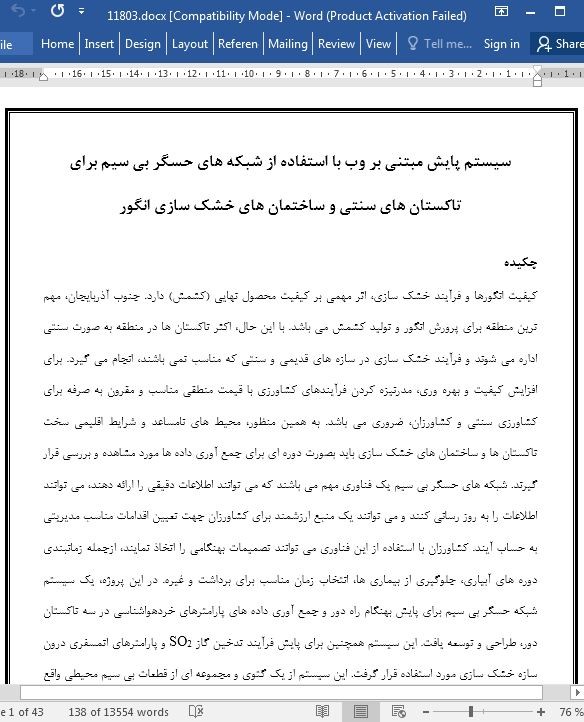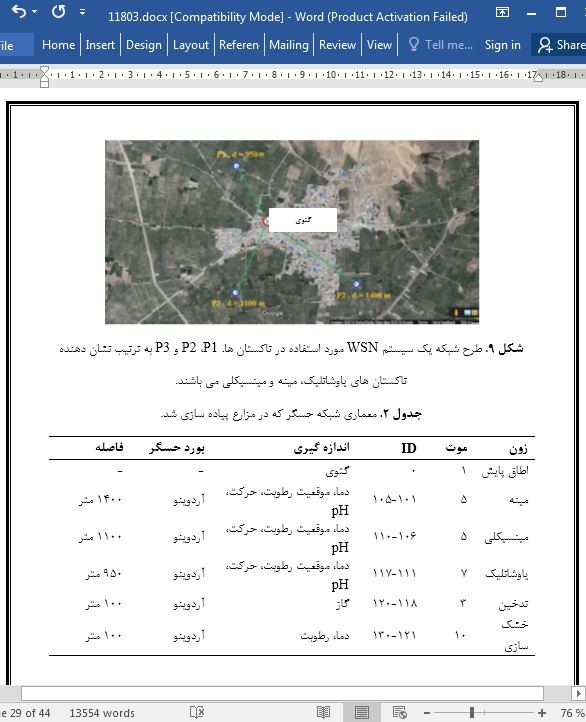
سیستم پایش مبتنی بر وب با استفاده از شبکه های حسگر بی سیم برای تاکستان های سنتی
چکیده
کیفیت انگورها و فرآیند خشک سازی، اثر مهمی بر کیفیت محصول نهایی (کشمش) دارد. جنوب آذربایجان، مهم ترین منطقه برای پرورش انگور و تولید کشمش می باشد. با این حال، اکثر تاکستان ها در منطقه به صورت سنتی اداره می شوند و فرآیند خشک سازی در سازه های قدیمی و سنتی که مناسب نمی باشند، انجام می گیرد. برای افزایش کیفیت و بهره وری، مدرنیزه کردن فرآیندهای کشاورزی با قیمت منطقی مناسب و مقرون به صرفه برای کشاورزی سنتی و کشاورزان، ضروری می باشد. به همین منظور، محیط های نامساعد و شرایط اقلیمی سخت تاکستان ها و ساختمان های خشک سازی باید بصورت دوره ای برای جمع آوری داده ها مورد مشاهده و بررسی قرار گیرند. شبکه های حسگر بی سیم یک فناوری مهم می باشند که می توانند اطلاعات دقیقی را ارائه دهند، می توانند اطلاعات را به روز رسانی کنند و می توانند یک منبع ارزشمند برای کشاورزان جهت تعیین اقدامات مناسب مدیریتی به حساب آیند. کشاورزان با استفاده از این فناوری می توانند تصمیمات بهنگامی را اتخاذ نمایند، ازجمله زمانبندی دوره های آبیاری، جلوگیری از بیماری ها، انتخاب زمان مناسب برای برداشت و غیره. در این پروژه، یک سیستم شبکه حسگر بی سیم برای پایش بهنگام راه دور و جمع آوری داده های پارامترهای خردهواشناسی در سه تاکستان دور، طراحی و توسعه یافت. این سیستم همچنین برای پایش فرآیند تدخین گاز SO2 و پارامترهای اتمسفری درون سازه خشک سازی مورد استفاده قرار گرفت. این سیستم از یک گتوی و مجموعه ای از قطعات بی سیم محیطی واقع در تاکستان ها و درون سازه خشک سازی تشکیل شده است که به حسگرهای هواشناسی کشاورزی و پایش زیست محیطی مجهز بوده و برای ذخیره سازی و انتقال داده ها از طریق گتوی، مجهز می باشند. گتوی داده های هواشناسی کشاورزی را جمع آوری کرده و از یک فناوری بی سیم برای انتقال داده ها و برای برقراری ارتباطات بین قطعات و سرور مرکزی (صفحه وب) استفاده می نماید. علاوه بر این، یک سیستم هشدار آنلاین (بهنگام) در گتوی برای ارسال سیگنال های آلارم از طریق SMS (خدمات پیام کوتاه)، تعبیه شد. این دستگاه ها به لحاظ عاملیت پیکربندی نرم افزار، عملکرد سخت افزار و دستیابی به داده ها، مصرف انرژی و اتصال مورد آزمون قرار گرفتند. نتایج آزمایشات میدانی نشان دادند که این سیستم یک سیستم پایش کامل را ارائه می دهد که عملکرد مؤثری برای توسعه سیستم های اطلاعات در زراعت دقیق انگور فراهم می آورد.
7. بهبودهای آتی
این پروژه می تواند در مطالعات آتی به منظور بهبود سیستم در حوزه های مختلف تعمیم داده شود، ازجمله
(1) سیستم هشدار آنلاین قادر به تولید یک آلارم هشدار دهنده وجود حشرات مزاحم نمی باشد. این سیستم هشدار به یک پروژه تحقیقاتی پردازش سیگنال جامع به منظور شناسایی و تمایز صداهای حشرات آسیب رسان از دیگر صداهای محیطی نیاز دارد. علاوه بر این، یک روش پردازش تصویر را می توان برای شناسایی کمبودها، آفات، بیماری ها و سایر عوامل تعیین کننده در تاکستان ها، اضافه نمود.
(2) اندازه گیری های جابجایی آب در گیاه به عنوان شاخص تعرق تاک و وضعیت آب گیاه در طول فصل می تواند یک ابزار جایگزین برای بهینه سازی و مدیریت آبیاری فراهم آورد. در کارهای آتی، این روش را می توان در سیستم های کنونی WSN به کار برد.
Abstract
The quality of grapes and the drying process has a momentous impact on the quality of the final products (raisins). South Azerbaijan is the most important region for grape growing and raisin producing. However, the majority of the vineyards in the region are traditional, and the drying process is carried out in conventional structures that are not convenient. To increase the quality and productivity, it is necessary to modernize agricultural practices with reasonable cost suitable and affordable to traditional farming and farmers. To do this, the harsh environments and severe climate conditions of the vineyards and the drying buildings should be observed periodically to collect data. Wireless Sensor Networks are a key technology that can provide precise information, can update information, and can be a valuable resource to farmers to determine appropriate management practices. Using this technology, farmers can make real-time decisions such as scheduling irrigation periods, preventing diseases, choosing the right time for harvesting and so on. In this project, a Wireless Sensor Network system was designed and developed for remote real-time monitoring and collection of micrometeorological parameter data in three distant vineyards. The system was also used for monitoring the SO2 gas fumigation process and atmospheric parameters inside the drying structure. The system consists of a gateway and a series of peripheral wireless motes placed in the vineyards and inside the drying structure, which are equipped with agrometeorological sensors for environmental monitoring and for storing and transmitting data to the gateway. The gateway collects agrometeorological data and utilizes a wireless technology for data transmission and for communication between the motes and the central server (webpage). In addition, an on-line (real-time) warning system was embedded in the gateway to send alarm signals via SMS (Short Message Service). The devices were tested for software configuration functionality, hardware operation and data acquisition, energy consumption, and connectivity. Field experiment results demonstrated that the system represents a complete monitoring system, which provides efficient performance for developing information systems in precision viticulture.
7. Future improvements
This project can be extended in future studies in order to improve the system in various domains such as
(1) The online warning system was not able to generate an alarm warning of the presence of nuisance insects. This warning system needs a comprehensive signal processing research project in order to detect and distinguish the depredating insect sounds from other environmental sounds. Moreover, an image processing method can be added to the system for recognizing deficiencies, pests, diseases, and other detrimental agents in the vineyards.
(2) Sap-flow measurements as an indicator of vine transpiration and plant water status throughout the season can provide an alternative tool to optimize and manage irrigation. In future work, this method can be applied in the current WSN system.
چکیده
1. مقدمه
2. دلایل و اهداف پروژه
2.1. تاکستان
2.2. ساختمان خشک سازی
3. بررسی متون مرتبط
4. مواد و روش ها
1.4. طراحی معماری
2.4. انرژی
3.4. تضمین و استقرار
5. نتایج آزمایشگاهی و بحث
1.5. تاکستان ها
2.5. سازه خشک سازی
6. نتیجه گیری
7. بهبودهای آتی
منابع
Abstract
1. Introduction
2. Reasons and objectives of the project
2.1. Vineyard
2.2. Drying building
3. Relevant research review
4. Materials and methods
4.1. Architecture design
4.2. Energy
4.3. Stipulation and deployment
5. Experimental results and discussions
5.1. Vineyards
5.2. Drying structure
6. Conclusion
References
- اصل مقاله انگلیسی با فرمت ورد (word) با قابلیت ویرایش
- ترجمه فارسی مقاله با فرمت ورد (word) با قابلیت ویرایش، بدون آرم سایت ای ترجمه
- ترجمه فارسی مقاله با فرمت pdf، بدون آرم سایت ای ترجمه



